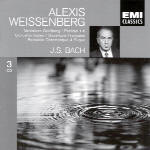If Rosalyn Tureck is the High Priestess of Bach, then Alexis Weissenberg reigns as Bach’s Lord High Executioner in these 1966/67 recordings. Playing faster than the ear can often absorb, Weissenberg’s hands seem like a pair of scissors with freshly sharpened blades in place of fingers, as exemplified throughout the First, Second, and Fifth Partitas, the Chromatic Fantasy and Fugue, and the Italian Concerto’s outer movements. A more joyful kind of energy seeps through the Third Partita, while Weissenberg (for the most part) plays the Fourth and Sixth more clearly and sensitively than on his flippantly sadistic 1990 DG traversals. When textures thicken, Weissenberg tends to rush tempos, blur his phrases, and let his flinty tone grow all the more clangorous. This is especially hurtful in the Goldberg Variations, although some of the slower movements (Variations 2, 9, 13, 15, and 19, for instance) are intelligently shaped. As with his 1982 EMI Goldbergs remake (not available on CD in the U.S.), Weissenberg observes each and every repeat. He is less generous with repeats in the other works. Not for the faint of heart. [2/16/2001]
































